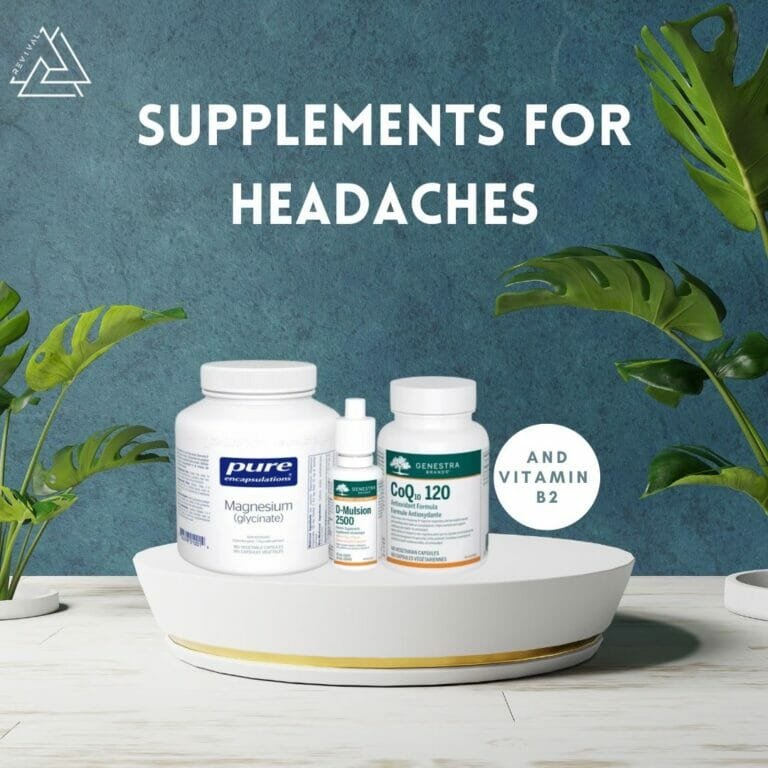
Headaches and migraines are common issues experienced by many individuals. Successful treatment involves addressing both the acute phase of the headache/migraine and preventing future occurrences. At Revival, Airdrie’s Injury and Chronic Pain Clinic, we offer comprehensive solutions, including Athletic Therapy, Massage Therapy, Cold Laser Therapy and specialized treatments such as Access Bars®, RAPID Neurofascial Reset and Fascial Stretch Therapy and Craniosacral therapy (CST), for headache and migraine relief.
In addition, certain supplements have shown scientific evidence in decreasing the frequency and severity of headaches and migraines over time. Supplements play a role more on the prevention part by helping to decrease the frequency and intensity of headaches/migraines over time.
There are four supplements that have scientific evidence and studies that support the claim that they can help decrease the occurrence and severity of headaches and migraines over time. Let’s explore the role of CoQ10, Magnesium, Riboflavin (B2), and Vitamin D in providing effective relief.
CoQ10
CoQ10 is a very well-studied and documented antioxidant that has been shown to play a crucial part in mitochondrial cellular energy production. There is a 2019 meta-analysis study involving 346 patients (120 pediatric and 226 adult participants) which found that CoQ10 was similar to placebo with respect to migraine attacks per month and migraine severity per day however it performed much better than placebo by reducing the number of migraine days per month and overall migraine duration (5). Another meta-analysis study of 371 participants found that coenzyme Q10 supplementation appeared to have beneficial effects in reducing the duration and frequency of migraine attacks (2).
The dosage varied across the studies starting with as little as 30 mg to as high as 800 mg. A consensus of 300-400 mg/day seemed to be the most prevalent dosage for CoQ10.
Magnesium
Magnesium is a ubiquitous mineral that is involved in many processes in the body. In terms of headache support, Magnesium may provide mild migraine prevention and an overall reduction of symptoms.
A 2018 systemic study review concluded that high doses of 600 mg of Magnesium citrate helps to prevent and reduce migraines as compared to the control/ placebo group (4).
Note: Mag Citrate is more bioavailable than Mag Glycinate however Mg Glycinate is more gentle on the stomach and better tolerated overall, especially at the higher doses needed while still being bioavailable.
Riboflavin (B2)
Riboflavin, commonly known as one of the B vitamins (B2 vitamin) more specifically, has shown potential in headache reduction and duration. A 1998 study of 55 patients administered 400 mg of B2 vs placebo concluded that the patients that took B2 reported a reduction in migraine attacks per month (3).
A 2020 study found that B2 is comparable to Valproate in prophylaxis treatment.
Note: Adverse effects from high riboflavin intakes from foods or supplements (400 mg/day for at least 3 months) have not been reported. A 2021 review found that in all of the studies included in the review, riboflavin was well tolerated without major side effects or safety concerns.
Vitamin D
Has a multitude of effects on the body. In the migraine/headache context, Vitamin D supports inflammation and nerve health so a deficiency could lead to inflammation and nerve pain leading to a headache and a more serious migraine.
A meta-analysis of 301 patients looked at whether Vitamin D plays any role in migraine management. The authors concluded that supplementation with vitamin D at a minimum dosage of 2000 IU/day could reduce the number of headache attacks per month, decrease the need of analgesics and reduce the duration of the headache (1).
At Revival, Airdrie’s Injury and Pain Clinic, we recognize the complexity of headache and migraine treatment. Our multidisciplinary approach, combining Athletic Therapy, Massage Therapy, Cold Laser therapy and the use of evidence-based supplements, can provide comprehensive relief and improve your quality of life. CoQ10, Magnesium, Riboflavin (B2), and Vitamin D have demonstrated positive outcomes in reducing the frequency and severity of headaches and migraines. We encourage you to consult with our expert team to discuss personalized treatment options tailored to your specific needs.

Disclaimer:
The information provided in this blog post is for educational and informational purposes only. It is not intended to be a substitute for professional medical advice, diagnosis, or treatment. Always seek the advice of your healthcare provider or qualified medical professional with any questions you may have regarding your specific condition or medical needs.
The content of this blog post, including references to scientific studies, is based on current research available at the time of writing. However, research in the field of headache and migraine treatment is constantly evolving, and new evidence may emerge that could affect the information provided here. Therefore, we make no representations or warranties of any kind, express or implied, about the completeness, accuracy, reliability, suitability, or availability of the information contained in this blog post.
Any reliance you place on the information in this blog post is strictly at your own risk. We disclaim any liability for any damages or injuries, whether direct, indirect, consequential, or incidental, arising from the use of the information in this blog post or any linked resources.
Furthermore, it is important to note that individual experiences and responses to treatment may vary. What works for one person may not work for another, and results may differ based on individual circumstances, medical history, and other factors. Therefore, we cannot guarantee specific outcomes or results from the use of supplements or treatments discussed in this blog post.
Always consult with a qualified healthcare professional or your physician before starting any new supplements, treatments, or making changes to your healthcare regimen. They can provide personalized advice and guidance based on your specific needs and medical history.
Inclusion of any specific products, supplements, or treatment techniques in this blog post does not imply endorsement or recommendation by our clinic. We encourage you to conduct your own research and make informed decisions based on your individual needs and in consultation with your healthcare provider.
The views expressed in this blog post are solely those of the author and do not necessarily reflect the views of our clinic or its staff.
Please consult our clinic directly for personalized advice and treatment options tailored to your specific needs.
REFERENCES
- Hu C, Fan Y, Wu S, Zou Y, Qu X. Vitamin D supplementation for the treatment of migraine: A meta-analysis of randomized controlled studies. Am J Emerg Med. 2021 Dec;50:784-788. doi: 10.1016/j.ajem.2021.07.062. Epub 2021 Aug 11. PMID: 34879503.
- Sazali S, Badrin S, Norhayati MN, Idris NS. Coenzyme Q10 supplementation for prophylaxis in adult patients with migraine-a meta-analysis. BMJ Open. 2021 Jan 5;11(1):e039358. doi: 10.1136/bmjopen-2020-039358. PMID: 33402403; PMCID: PMC7786797.
- Schoenen J, Jacquy J, Lenaerts M. Effectiveness of high-dose riboflavin in migraine prophylaxis. A randomized controlled trial. Neurology. 1998 Feb;50(2):466-70. doi: 10.1212/wnl.50.2.466. PMID: 9484373.
- von Luckner A, Riederer F. Magnesium in Migraine Prophylaxis-Is There an Evidence-Based Rationale? A Systematic Review. Headache. 2018 Feb;58(2):199-209. doi: 10.1111/head.13217. Epub 2017 Nov 13. PMID: 29131326.
- Zeng Z, Li Y, Lu S, Huang W, Di W. Efficacy of CoQ10 as supplementation for migraine: A meta-analysis. Acta Neurol Scand. 2019 Mar;139(3):284-293. doi: 10.1111/ane.13051. Epub 2018 Dec 3. PMID: 30428123.
